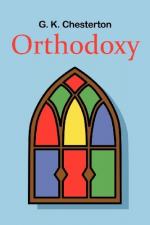
|
| Name: _________________________ | Period: ___________________ |
This test consists of 15 multiple choice questions and 5 short answer questions.
Multiple Choice Questions
1. Why does Chesterton think glass is so often used in fairy tales?
(a) Glass is unusual for shoes and houses, and fitting to fairy tales.
(b) Glass is cheap and common.
(c) Glass easily portrays vivid emotions like anger.
(d) Glass, like happiness, is easily broken.
2. According to Chesterton, who is the only person to whom a modern realistic novel would not be boring?
(a) A writer of fairytales.
(b) A scientist.
(c) A child of ten.
(d) A baby.
3. According to Chesterton at the beginning of the first chapter, why did he write the book?
(a) As a personal challenge to himself.
(b) In response to a challenge.
(c) Because he had to work through his religious beliefs.
(d) Because he had a well-crafted argument for Christianity.
4. Why does Chesterton say that the Christian virtues have become crazy?
(a) They are isolated from all other virtues.
(b) They are practiced in the wrong contexts.
(c) They are not truly Christian.
(d) They are separate from the Bible.
5. According to Chesterton, what symbol explains to way that mysticism clarifies the world?
(a) A mountain.
(b) The sun.
(c) The ocean.
(d) The moon.
6. What did Chesterton discover about the truths he found in religious thought?
(a) They could not be lived out.
(b) They were not fully truth.
(c) They contradicted each other.
(d) They were not his.
7. According to Chesterton, what effect does the moralists' attitude have on the cosmos?
(a) Fairy tales cannot explain the cosmos.
(b) God has no part in the cosmos or its creation.
(c) There can never be anything interesting.
(d) There are exciting possibilities.
8. How does today's skeptic compare to the skeptic of the French Revolution, according to Chesterton?
(a) Today's skeptic is not a Jacobin.
(b) Today's skeptic is not nearly so violent.
(c) Today's skeptic cannot even define what he trusts.
(d) Today's skeptic is a true revolutionary.
9. Who is Mr. Blatchford?
(a) A humanitarian.
(b) A martyr.
(c) An early Christian.
(d) A pagan.
10. What fact do religious men no longer accept as a foundational belief?
(a) Sin.
(b) Forgiveness.
(c) Mercy.
(d) Righteous wrath.
11. What widespread mistake about mystical imagination does Chesterton want to erase?
(a) It distracts a man unnecessarily.
(b) It is suitable only for children.
(c) It is damaging to a man's mental capacity.
(d) It greatly benefits a man's mental capacity.
12. As revealed in Chapter Two, what is the secret of mysticism?
(a) A man can understand life through things he does not understand.
(b) A man can try to understand life through the supernatural.
(c) Mysticism provides a lens for understanding the supernatural.
(d) Mysticism leads to God, who has the answers.
13. Why does Chesterton admire Joan of Arc?
(a) She is everything that he admired.
(b) She provides courage to the French.
(c) She turned her fright into courage, when faced with battle.
(d) She is an icon of Christianity and courage.
14. How does the book look in relation to Chesterton, according to the author himself?
(a) Egotistical.
(b) Self-sufficient.
(c) Paltry.
(d) Altruistic.
15. What is Chesterton's attitude toward fairy tales?
(a) He thinks fairy tales are harmful to a child's mind.
(b) He thinks fairy tales are useful only in the nursery.
(c) He is surer of fairy tales than of anything else in the world.
(d) He thinks fairy tales are interesting but not useful in reality.
Short Answer Questions
1. As Chesterton explains the origin of the word, the moon is the mother of which group of people?
2. What is the problem with taking change as the ideal in a man's life, according to Chesterton?
3. Why does Chesterton think that materialism is much narrower than Christianity?
4. What does Chesterton think is the only cure for madness?
5. In a person's pursuit for truth, what might happen, according to Chesterton?
|
This section contains 673 words (approx. 3 pages at 300 words per page) |

|




